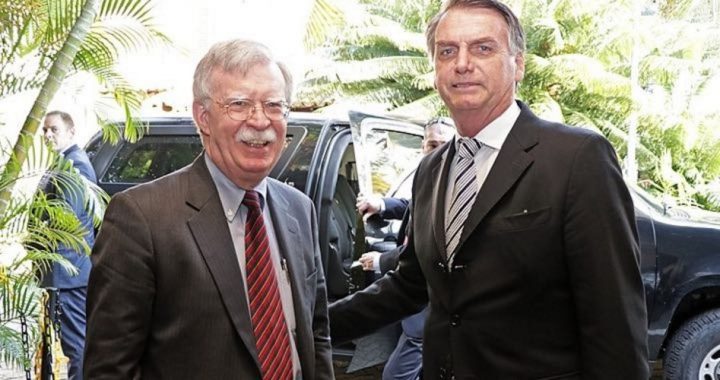
John Bolton (shown on left) is out as President Donald Trump’s national security adviser, Trump announced in a tweet early Tuesday. Bolton and Trump had always been like the “Odd Couple” of movie and TV fame, with Bolton representing the interventionist foreign policy hawk positions that Trump had rightly castigated the Bush and Obama presidencies for.
In the early days of the administration of President Ronald Reagan, Reagan’s secretary of state, Alexander Haig, brought up the need to send the Law of the Sea Treaty (LOST) to the Senate for ratification. LOST was a massive transfer of power to the United Nations, and defined the rights and responsibilities of the world’s nations use and management of the resources of the world’s oceans.
Haig told Reagan that the Carter administration was in agreement with LOST, and that multiple presidencies had worked on it. When Reagan said that he had problems with LOST, Haig retorted that it was already a done deal, to which Reagan told Haig that, on the contrary, that is what the election was all about.
Haig soon left the administration, and while Reagan did many things during his tenure that constitutional conservatives did not like, that was a good move. But why did Reagan appoint someone with Haig’s attitude to begin with?
The same question has been asked about Trump’s curious appointment of Bolton. After all, Bolton is well known as a neoconservative hawk — someone who sees the United States as the world’s policeman, while Trump ran for president criticizing the tendency of recent U.S. presidents to entangle America into overseas conflicts.
Bolton officially resigned, but Trump tweeted that he had asked Bolton for his resignation. Media reports indicate that Bolton’s ouster was due to Bolton’s alleged leaking when he did not get his way on a foreign policy question, which must have been quite often since Trump’s public philosophy against foreign involvements was in such stark contrast to Bolton’s long-time advocacy of the position that it was in the best interests of the United States to send American forces into various and sundry conflicts around the globe.
“I informed John Bolton last night that his services are no longer needed at the White House,” Trump tweeted. “I disagreed strongly with many of his suggestions, as did others in the Administration, and therefore … I asked John for his resignation, which was given to me this morning. I thank John very much for his service. I will be naming a new National Security Adviser next week.”
Americans who hoped that Trump was sincere when he called for a less interventionist foreign policy in the 2016 campaign are now hopeful that the president will tap someone who is more aligned with that stated non-interventionist foreign policy — in short, someone who agrees with Trump’s stated “American First” foreign policy.
Stephanie Grisham, Trump’s White House press secretary, explained that there were simply too many philosophical differences between the two for Bolton to stay on as national security adviser.
While some attempted to cite personality differences for Bolton’s ouster, the more likely reason that Bolton was canned was his public opposition to Trump’s desire to extricate American military personnel from Afghanistan, and to avoid a military confrontation with Iran.
After Iran shot down an American drone, it is believed that Bolton urged Trump to retaliate by bombing Iranian oil refineries. When Trump decided against doing so, citing concern that such a strike would lead to the deaths of scores of innocent Iranians over one drone, it is believed that Bolton was very disappointed. Bolton has been publicly advocating direct military action against Iran for some time.
Some sources say that Trump was increasingly irritated with Bolton’s smugness and arrogance. Bolton is no doubt intelligent, and it is likely that he had expressed his frustration at Trump’s refusal to follow supposedly sage advice from Bolton.
In addition to differences over strategy concerning Iran and Afghanistan, it is believed that Bolton was pushing Trump to take a more aggressive policy in ousting the socialist government of Venezuela. And, when talks broke down between the United States and the Taliban rebels in Afghanistan, many media sources reported that Bolton was an opponent of the potential deal. Bolton has publicly cautioned against withdrawing from Afghanistan, despite America having troops in the country for nearly 20 years already.
While many Americans who favor a less interventionist foreign policy are rightly pleased with the departure of John Bolton, questions have been raised as to why Trump does not select advisers who are more in agreement with him on such fundamental foreign policy issues. After all, Bolton was Trump’s third national security adviser, and the previous adviser, H.R. McMaster, a former lieutenant general, was not much different, if at all, from Bolton on these types of questions.
It appears that Trump’s inclination is to pull back from the hyper-interventionist foreign policy of previous presidents, but it is also apparent that he is susceptible to persuasion from interventionists. For example, Trump’s daughter, Ivanka, was said to have played a large role in persuading Trump to bomb Syria, after she convinced her father that bombing Syria was a needed response to the alleged use of chemical weapons by Syrian President Bashar Assad in the Syrian Civil War.
Perhaps Trump’s fourth pick for national security adviser will be a person who actually understands that it is not in the interest of the United States to become entangled in overseas military adventures. If Trump is serious about changing the interventionist tendency of recent American presidents, perhaps he could get some advice from former Texas Congressman Ron Paul and former White House adviser Pat Buchanan as to who would make a good national security adviser.
Photo of John Bolton (left): U.S. Consulate
Steve Byas is a university history instructor and author of History’s Greatest Libels. He may be contacted at [email protected]



